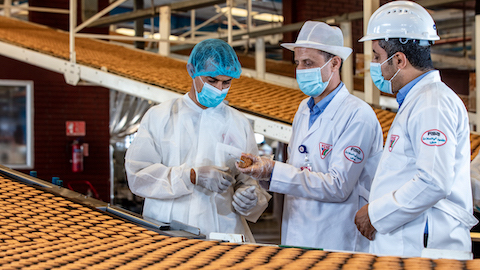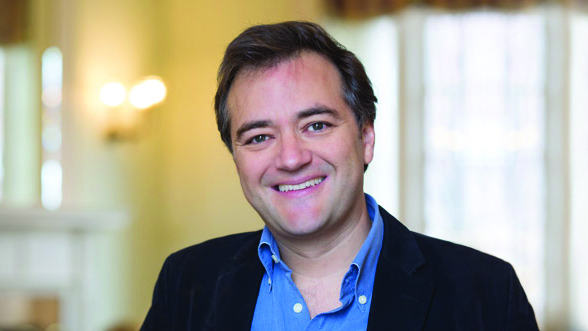State Garden: People, Planet, Produce
Interview with Mark DeMichaelis, third-generation owner and CEO,
State Garden, USA

Founding State Garden in 1938 in Boston's North End neighbourhood, the DeMichaelis family spent decades growing a modest resale business packaging leaf greens, spinach and celery hearts. Regardless of the extra effort required, they conducted their business in a way that prioritised their suppliers, employees and consumers. The loyalty and trust they received in return have played an integral role in sustaining the business, even as its requirements and products changed.
![The DeMichaelis family [L-R] Mark, Kevin, Marion, John Sr and John Jr; image courtesy of State Garden](./assets/clbSQh2WBV/imageedit_23_2542376653-480x480.png)
The DeMichaelis family [L-R] Mark, Kevin, Marion, John Sr and John Jr; image courtesy of State Garden
The DeMichaelis family [L-R] Mark, Kevin, Marion, John Sr and John Jr; image courtesy of State Garden

State Garden began as a two-person operation. Founder Giovanni DeMichaelis, a recent émigré from Italy, and his daughter, Anna, would start at 4 AM to wash and trim celery by hand, improving its appearance and quality. Then, they would package it and bring it to market.
As Giovanni could neither speak nor write in English, Anna dealt directly with suppliers and buyers, all while pursuing a bookkeeping degree part-time in the evenings. She set a precedent for treating people right, maintaining excellent working relationships with State Garden's stakeholders on every level. She would continue to model these values — the foundations of State Garden's societal sustainability — well into the 21st Century.
Had it been otherwise, State Garden wouldn't be the business it is today. When third-generation CEO Mark DeMichaelis saw an opportunity in organic products, but first had to convince suppliers that the shift to organic would pay off in the long run, the generations of trust that Anna began to cultivate six decades earlier were essential. The suppliers said yes because they knew Mark wasn't just thinking about his business; he was thinking of the bigger picture.
Since then, State Garden has grown to more than 900 employees and become one of the leading organic produce brands in the US. State Garden's organic segment, Olivia's Organics, helped the family company grow from $15 million in revenue in 1998 to $100 million in revenue in 2008. And still, the third generation of the DeMichaelis family, brothers Mark III, Kevin III and John III, continued to give rides to older employees who couldn't drive on the way in to the office, and deliver products to customers by hand on the way home if there was a shortage.
Illustrating the concept of societal sustainability on a larger scale, a portion of the proceeds from Olivia Organics goes directly to the label's eponymous foundation to support community-based charitable programs for children, including the Greater Boston Food Bank and the Kids Clothes Club, amongst others.
We spoke to Mark DeMichaelis about the importance of maintaining good working relationships, how trust eases transitions and how the fourth generation of the DeMichaelis family is getting involved in the business.
Image 1: Giovanni DeMichaelis, a recent emigre from Italy, and his daughter, Anna
Image 2: Faneuil Hall, where State Garden was based in the early days; image courtesy of State Garden



Mark, John Sr, Kevin and John Jr; image courtesy of State Garden
Mark, John Sr, Kevin and John Jr; image courtesy of State Garden

John Sr on the left with an unknown customer circa 1960; image courtesy of State Garden
John Sr on the left with an unknown customer circa 1960; image courtesy of State Garden
What is your earliest memory of your family business?
My earliest memory is of my mother driving my two brothers and me to Chelsea, Massachusetts, where my father was working. She would pile the three of us in her old wood-panelled station wagon and drive us to visit him for lunch. I remember just watching him work. He struck me as a man who enjoyed getting his hands dirty every day.
When I joined the family business years later, we worked together in the same facility, and the company hadn't grown much since I was a child. My dad and my aunt ran the business after my grandfather stepped down, so it felt no different than getting the family together on a Sunday for dinner — except, of course, we focused on business.
One of the things my father would always remind us of — whether he was discussing a customer, an employee, or a supplier — is how good they've been to us. This meant that he fully appreciated the commitment that makes an employee show up to work for 50 or 60 hours a week for the benefit of the company. And he made us understand that people can get paychecks anywhere, but what they want most is to feel valued; this is something else that's stuck with me.
What was one of State Garden's key turning points before you joined?
Back in the 1960s when my dad was running the business out of a waterfront property, he was offered $15,000 to vacate so the city could develop what is now the Faneuil Hall marketplace. He took that money and added it to his savings, then re-invested it in a new facility — the place that my mother used to take my brothers and me to. There's no doubt that was a key turning point in State Garden's history.
The pivotal moment for my generation specifically was in the 90s when we realised that expansion was necessary. We invested heavily in the pre-wash salad business, which was somewhat in its infancy at the time. That move eventually enabled our entrance into the organic produce market.
Image: State Garden's production floor; image courtesy of State Garden


Urban farm volunteers; image courtesy of State Garden
Urban farm volunteers; image courtesy of State Garden

Italian Home 2019 team; image courtesy of State Garden
Italian Home 2019 team; image courtesy of State Garden

State Garden team supporting Kids Clothes Club; image courtesy of State Garden
State Garden team supporting Kids Clothes Club; image courtesy of State Garden
How did State Garden get into organic produce?
When we entered the pre-washed salad business in the early 2000s, approximately 90-95 per cent of State Garden's produce was conventionally grown, and five per cent was organic. That segment of the company was very small, selling only around two loads a week of baby lettuces, spring mix, baby spinach and arugula, but my brothers and I understood that the potential for growth was tremendous.
Sourcing organic produce was the first obstacle standing in our way. Organic farmers can't use conventional pesticides to protect their crops, and so they risk losing entire harvests to pests. Also, organic certification requires that fields be left fallow for three years to allow the soil to lose any trace of the synthetic products that previous non-organic crops were treated with.
Our suppliers were understandably reticent. It took the three of us several trips out west before we could convince them to make the shift to organic, thereby enabling our transition. And regardless, they wouldn't have done so if we hadn't been dealing fairly with them for decades: they had to trust us, and they did.
We then had to concentrate on the consumer-facing side of the business. I quickly learned that the customer base for organic produce wants to know that the company they're buying from is true to their values and principles. So, we needed to brand the company in a way that represented both who we already were and who we wanted to be.
We tried several different concepts, from the Big Red Barn Company to the Earthy Crunchy Salad Company, but none of them resonated with us. Then, one day, a co-worker walked into my office and said that she was tired of watching us fumble around with the idea. "What's your daughter's name?", she asked, and I replied, "Olivia." She said, "Isn't 'Olivia's Organics' a nice idea?"
We immediately knew that this was an opportunity to champion our values and ethics. It was a fresh look – the branding was vibrant, and it really stood out on the shelf.
We decided to launch the Olivia's Organics Children's Foundation at the same time, which gave us a philanthropic mission in tandem with the business endeavour. The Foundation soon became very active in the Greater Boston Food Bank, donating to children's cafes and school lunch programmes – something that I believe generated increased customer support.

Also in this collection:

|

|

|

|

|

|


What environmental issues drove State Garden's move towards organic produce?
I grew up in a town just north of Boston that experienced some very severe environmental issues. I knew a lot of children who became extremely ill from drinking water containing hazardous waste that had been illegally dumped. This became somewhat of a rallying point in the community to ensure everyone was doing their utmost to prevent ground pollution.
Later, I began to wonder what we could do in our little corner of the world to help address wider environmental issues. So, the transition to organic all those years later was really a culmination – something that went to the core of who we were as a family. And if you can be environmentally conscious and make money at the same time, it's a win-win situation.
You work alongside brothers in the family business. How did the three of you settle on your roles?
My brothers and I have very different personalities, and when we joined State Garden, we just naturally assumed the roles we were comfortable with. This meant that we weren't clamouring over the same job, and we were able to give each other enough space to define individual titles. My brother John was always very heavily involved in the plant and the operations, while my brother Kevin focused on sales. My role was to oversee the general direction of the company.
When it came time to make a key decision, we would sit down and ask whether it's a move that we really want to make. We governed State Garden by unanimity, so if one of my brothers or I said no to something, it was ruled out immediately. There were times when we disagreed, but we respected each other's opinions. That respect is one of the keys to our success.
Image: State Garden's production floor; image courtesy of State Garden

What is the most significant challenge for businesses trying to find a sustainable footing in your industry?
Balancing concern for the planet with concern for profits is the real challenge, and some companies are up against a brick wall. If consumers won't buy products at the price required to make them more environmentally friendly or sustainable, implementing those solutions is near impossible.
You can have the best intentions, but you also need to consider whether you're putting yourself at a competitive disadvantage and whether you'll be able to sustain profitability; balance is key.
We're in a quarterly-driven economy. And the fact is, if we don't make our numbers every quarter, we're either going to have upset investors or upset customers. So another challenge is switching from a quarterly outlook to a five-, 10-, 15- and even 20-year picture. This emphasis on short-term gains is a hindrance to businesses like ours trying to achieve sustainable production.



As a family business, we need to continue to improve, looking to increasingly sustainable practices to help drive this trend.
Mark DeMichaelis, third-generation owner and CEO, State Garden
Do you feel that family businesses are better suited to transition to sustainable production successfully than non-family-owned businesses?
Family businesses are, without a doubt, predisposed to longer-term thinking. The very nature of a family business forces its owners to think further down the road. But I also feel that family businesses aren't alone in prioritising sustainability practices.
I believe that every company, from Apple to Exxon, needs to look at what its legacy is going to be moving forward. Profit-making alone isn't a sustainable model. Different sectors are investing in ESG in ways that I'd never thought would be considered viable, and it's only gaining momentum.
All of this says that we, as a family business, need to continue to improve, looking to increasingly sustainable practices to help drive this trend. We may feel we're leading the way, but we can always do better — and we're trying to do so every day.

![Mark DeMichaelis and his children, [L-R] John Charles, Olivia and Mark Jr at the Women Fighting Hunger Awards, which Olivia won in 2018](./assets/7pf1qZyJWC/imageedit_21_3545692979-1200x1200.png)
Mark DeMichaelis and his children, [L-R] John Charles, Olivia and Mark Jr at the Women Fighting Hunger Awards, which Olivia won in 2018; image courtesy of State Garden
Mark DeMichaelis and his children, [L-R] John Charles, Olivia and Mark Jr at the Women Fighting Hunger Awards, which Olivia won in 2018; image courtesy of State Garden

What do you hope to see for the next generation in the family business?
My primary goal for all of them is to be happy. If you're not happy, you're not going to be successful, whatever it is you choose to do.
Secondly, the next generation is going to need to find a way to integrate their individual careers into the wider business. They need to forge their own way — I don't want them feeling that they're in the slipstream of the generation that preceded them.
I heard someone ask once, does the family keep the business together, or does the business keep the family together? And as we move forward to the fourth generation, I'm considering that question more and more.
Initially, I'd say the family keeps the business together. But then I think, well, if we didn't have the business, I wouldn't spend as much time with my brothers. I wouldn't see my nephews and talk to them every day. I wouldn't have my son come home and asking me about our history and our future. The business is the common ground between us, and the common future that we've invested ourselves in.



I believe that every company, from Apple to Exxon, needs to look at what its legacy is going to be moving forward. Profit-making alone isn't a sustainable model.
Mark DeMichaelis, third-generation owner and CEO, State Garden







